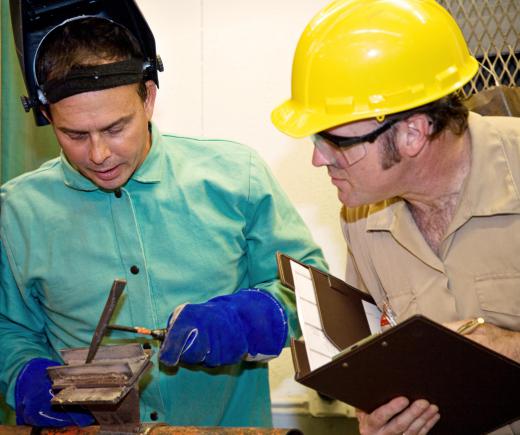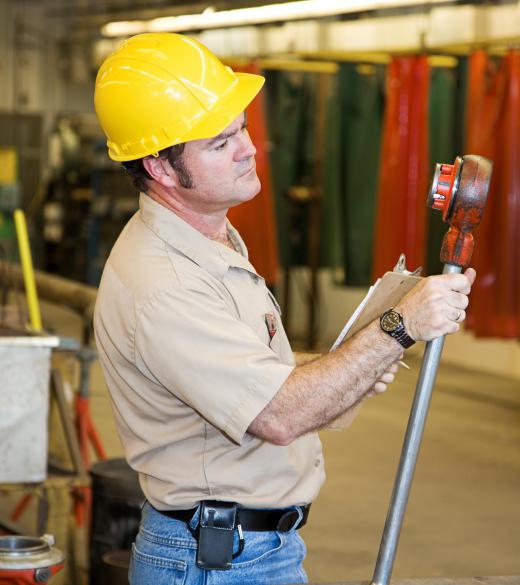At WiseGEEK, we're committed to delivering accurate, trustworthy information. Our expert-authored content is rigorously fact-checked and sourced from credible authorities. Discover how we uphold the highest standards in providing you with reliable knowledge.
What does a Quality Control Analyst do?
In an industrial setting, a quality control analyst might be responsible for checking products to make sure they meet the manufacturer's standards for safety and durability. He might also train other workers on how to check products. Many times, this individual can give suggestions as to how to make a product better. He could also try to determine the cause of problems that arise, in order to correct deficiencies.
Many times, an inspection by a quality control analyst is performed just before goods are packaged and shipped. This worker is often responsible for making sure there are no safety concerns, such as flaking paint or loose parts. He could also check to make sure the products are not defective in other ways. This may involve performing a series of tests to make sure all components are working properly.

Factories that have a high volume of production might need several workers to oversee quality control. In this instance, the analyst could be responsible for training employees to do these jobs. He might do this by first allowing people to observe him, then asking them to perform inspections under his direct supervision. Once he is confident in their abilities, he may only need to check on them from time to time.

A quality control analyst normally understands the manufacturing process well and as such can often recommend new methods that can both improve the quality of goods and save the company money. He may be called on to make presentations to members of management about proposed changes. Also, he could be one of the first to test new techniques before they are widely implemented.

When problems with a product occur regularly, a quality control analyst might need to find the source of these issues. This might mean he could check on workers on an assembly line to see that they are performing their tasks properly. He could also try to determine whether or not certain machines are not functioning effectively, and ask that they be repaired or shut down in some cases.

A quality control analyst is an important person in a factory setting. This is because he can keep faulty products from reaching consumers, which could cause a recall or lawsuit. By ensuring good quality control, the company maintains a profit and also maintains a reputation for providing quality goods. A steady profit and good reputation can be good for the economy, no matter where the manufacturer is located.
AS FEATURED ON:
AS FEATURED ON:















Discussion Comments
@SkyWhisperer - I work for a small software company and I think we need a QA analyst. Right now the only “quality control” that happens is when the customer gets the software and then complains back to us about bugs in the product.
We’ve even been plainly asked whether or not we test or software. It’s the programmer’s responsibility to do the testing, but that doesn’t always happen, at least not to the extent that it should. I think it’s unfair to make the customers the de facto guinea pigs for software testing.
@miriam98 - I think the distinction between the two is important, but I don’t think it’s as black and white as you make it, at least from what I’m reading in the article.
The quality control supervisor can recommend changes to existing processes since he understands manufacturing. Also, it appears his input and advice is often sought to make the workplace safer and more efficient.
So the quality control person is not simply the last checkpoint in the manufacturing chain. I wouldn’t be surprised if there were some cross training for both the quality assurance specialist and the quality control inspector.
@Mammmood - That’s a good point. Personally I think there is a lot more responsibility riding on the shoulders of the quality control inspector than the quality assurance specialist.
The quality control analyst must ensure that there are no safety hazards in the product before it’s shipped out. If there are, and the product gets shipped out on his watch, there could be lawsuits and that inspector would be out of a job in my estimate.
That of course wouldn’t be the worst thing to happen; people could be injured by the safety breach in the product. If it were me, I’d choose the quality assurance specialist career.
There is a lot of talk these days about ISO 9001 quality certification. Many companies have adopted these standards and some people are considering careers in quality control and process management.
I would like to point out however the differences between quality control vs quality assurance. As the article points out, quality control happens when the product is produced, and the quality control analyst checks to ensure that there are no defects in the product.
The quality assurance specialist however is concerned with the process used to make the product. He wants to ensure that the correct process was followed. Whether or not there is a defect in the final product is not the immediate issue.
I would assume that if the process was followed the product should be free of defects but that’s not here nor there. The point is, was the correct process followed? ISO usually deals with processes from what I understand.
Post your comments